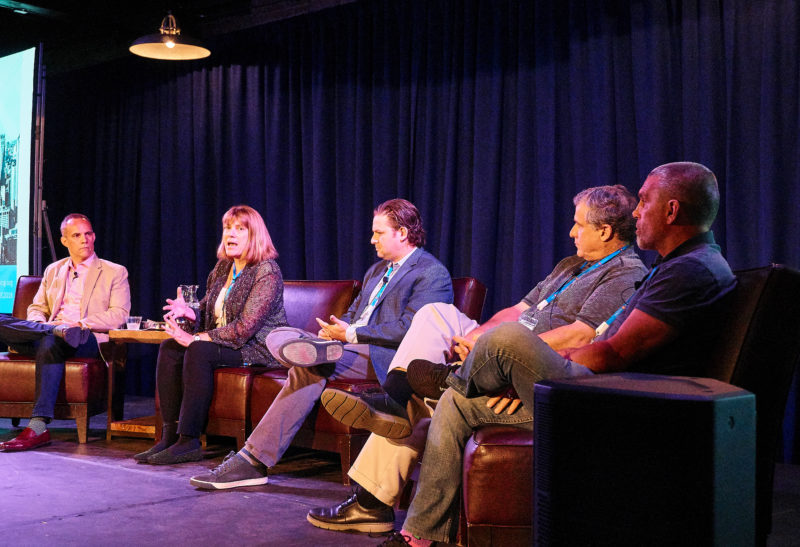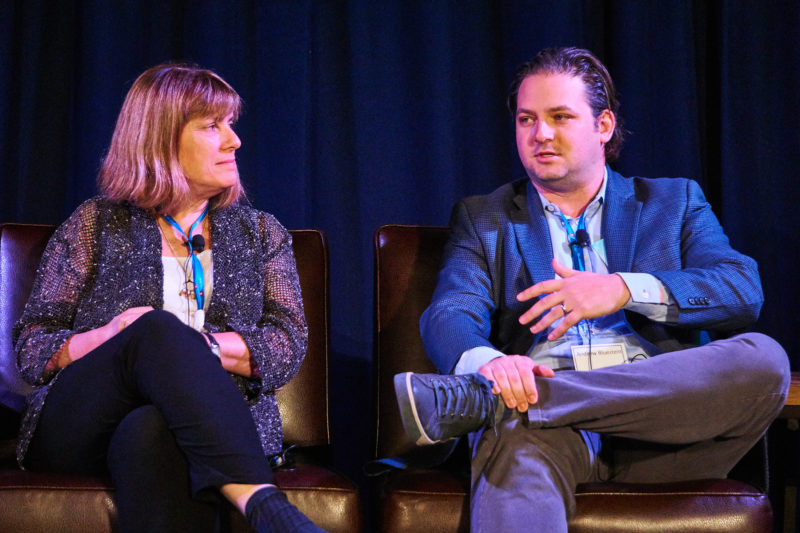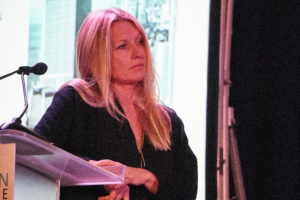by Bob Benenson, FamilyFarmed
Investors’ interest in early-stage Good Food businesses began to grow quickly about a decade ago, as venture capital began to recognize the profitable opportunities presented by the fast-rising consumer demand for locally and sustainably produced fresh and processed food. FamilyFarmed’s recognition of this trend spawned the creation of its Good Food Financing & Innovation Conference in 2011 (as a full day-part of its annual Good Food EXPO) and its Good Food Accelerator entrepreneur development program in 2014.
Within this relatively short period of time, the Conference and Accelerator helped facilitate more than $50 million in financing deals for small food businesses. This in turn prompted a reconfiguration as the Financing & Innovation Conference was removed from the EXPO and became a stand-alone event held last month in Chicago.
And not surprisingly, the Good Food investment community was spotlighted in an expert panel discussion. The participants were: Lauren Rosenthal, a founder and executive committee member for SLoFIG (Sustainable Local Food Investment Group) and a former FamilyFarmed board member; Andrew Bluestein, managing partner of Bluestein & Associates, which invests heavily in the Good Food space; Mark Thomann, co-founder of Spiral Sun Ventures, which invests in companies that create better-for-you consumer products; Chuck Templeton, managing director of Seed 2 Growth (S2G) Ventures, which invests in sustainable farm and food producers; and Peter Wilkins, managing director of Hyde Park Angels, the Midwest’s most active early-stage business investment group.

FamilyFarmed’s Good Food Financing & Innovation Conference on June 19 included a panel of investors who discussed the financial community’s increasing interest in the Good Food sector. The panelists were (from left) Peter Wilkens of Hyde Park Angels, Lauren Rosenthal of SLoFIG, Andrew Bluestein of Bluestein & Associates, Mark Thomann of Spiral Sun Ventures and Chuck Templeton of S2G Ventures. Photo: Bob Benenson/FamilyFarmed
The panel was moderated by Marianne O’Brien Markowitz — a former regional and national Administrator for the U.S Small Business Administration who is now managing director and U.S. National Government Lending Programs director for CIBC Bank and a member of FamilyFarmed’s Board of Directors.
The following are key insights from the panel discussion:
Lauren Rosenthal, Sustainable Local Food Investment Group
“As the name suggests, we’re looking for businesses that are sustainable and local. By local we mean Midwest, usually impacting the Chicago food hub. Sustainable means something different to each of our members. It can mean minimizing packaging, minimizing carbon footprint. It can mean supporting local agriculture, that’s a big factor for a lot of our members.”
“Companies come to us and they pitch like on Shark Tank, after they’ve been pre-screened to make sure they’re appropriate on the mission for us, and are companies that have a local impact on the food system. It can be anywhere from farming to manufacturing to food distribution to consumer packaged goods. We really look across the whole food chain experience. Each of individually decides if we want to invest in a particular company.”
“We’re not a philanthropy. We promote food businesses that are sustainable, businesses that are going to have a positive impact on our community.”
“One of the things that we look for in a company is that they focus. They know who they are, they know what they’re trying to do, they have a story and they stick with it. We sometimes have a company that will come in three times before they pitch the larger group, and they show up and suddenly they get nervous and by the end of the pitch they’re saying, And, we’re also going to expand into and we’re going to open this other thing here. And they lose our interest.”
Andrew Bluestein, Bluestein & Associates
“We’re a family office here in Chicago, and our focus as a family is to do venture investing in the food and retail industry. We cover all aspects of the value chain, so all the way from VC to consumer product to e-commerce, retail, restaurant to technology that may be impacting the industry.”
“We try to cover a wide area because as a seed investor primarily investing in early stage, those are needed to pinpoint what’s next. You can go online and read about the trends that are happening in the industry and those are widely known. But we are thinking about what’s going to be written about tomorrow. That’s really at the seed stage.”
“I think we take for granted what Big Food has been so good at, which is being able to create the same products consistently at low cost with long shelf life. When you’re pushing the envelope around innovation, talk about [High Pressure Pasteurization] or fresh or new ingredients, this isn’t stuff that Big Food is ready to do. It’s different. So whether you’re an in-house operation or working with a co-packer, being able to really master operations and really leading that within your company and having someone on the team that really understands and will find you the right partners. A lot of people start out thinking about, I’m creating a product and focusing on what the consumer wants. But you have to be both market-forward but you also have to have your team thinking about how do we make this product in a way that meets the needs around quality, consistency, taste and cost, shelf-stability, you name it.”

Lauren Rosenthal of SLoFIG (Sustainable Local Food Investment Group) is a former FamilyFarmed Board member. Andrew Bluestein of Bluestein & Associates is a mentor in FamilyFarmed’s Good Food Accelerator program. Photo: Bob Benenson/FamilyFarmed
Mark Thomann, Spiral Sun Ventures
“We invest in food, health and wellness, early-stage companies more broadly… The company I’m going to highlight today is TeaSquares. [Note: Tea Squares, like several Spiral Sun Ventures’ investments, is a graduate of FamilyFarmed’s Good Food Accelerator.] Michael Kaplan [Spiral Sun co-founder] was at Whole Foods, Jordan was doing a demo, and Michael came back to the office and said, ‘Hey, I met this young brilliant entrepreneur, he has a great product’… At the time, Jordan was doing roughly $8,000 in revenue. At first, I was like, It’s a little too small, it doesn’t quite fit our criteria… But we saw a young entrepreneur who had great values, great ethics, hard work, was very, very smart in how he was thinking about not only his company, how he could give back to his community. We invested, even at that very early stage, $100,000, really because he was a great entrepreneur who could really scale his business, but somebody we wanted to be part of.”

Marianne O’Brien Markowitz, a member of the FamilyFarmed Board of Directors, moderated the investor panel at the Financing & Innovation Conference. Markowitz, a managing director for CIBC Bank, is a former regional administrator and interim national administrator for the U.S. Small Business Administration. Photo: Bob Benenson/FamilyFarmed
“There’s really no playbook. The companies that we look at that have been successful in the CPG [consumer packaged goods] area are early-stage companies, in food primarily, and they figure out a way to mobilize the community… How do you develop and execute a marketing plan when you’re competing in categories where hundreds of millions of dollars are begin poured into the category? You have to be very strategic and tactical about how you do stuff.”
Chuck Templeton, S2G Ventures
“There certainly are challenges in food that aren’t there around software, other types of things. My background is technology and software and applications. That’s been one of the lessons for us is that these companies do take time to build. In my opinion, food is moving toward software in how lessons learned. It’s not about a $10,000 marketing study about what’s out there. It’s about getting your product out and testing. Your first year should be about learning what the consumer wants and how you meet those needs in a unique way that others can’t. We are less concerned about revenue early on, we’re more concerned, more interested about what are you learning about your consumer and channels and price point and packaging. Getting to that product-learning bit and not trying to be in every store at once.”
Peter Wilkins, Hyde Park Angels
“We first invested in Simple Mills [a fast-growing Chicago company that produces gluten-free and grain-free packaged cookies, crackers and mixes]. I think the idea of disrupting the baking space was what we were investing behind.”
“I think the most investable trend is putting in the hands of the consumer what they want in their house. Taking the last mile down the road of understanding people and what they consume. The story is in their house and if you can be in their house and figure out the way their behaviors are changing, you will rule the day.”
While the Good Food Financing & Innovation is behind us, FamilyFarmed continues to interact with the sector’s investment community. One of the key benefits to entrepreneurs selected to participate in FamilyFarmed’s annual Good Food Accelerator cohorts is the opportunity to connect with investors. The Accelerator will soon launch the application period for its fifth Accelerator cohort, with the six-month program beginning in November.
